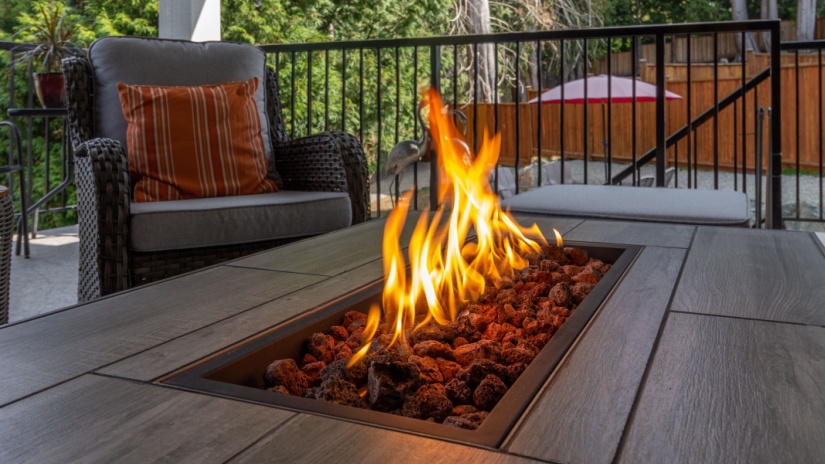Knowledge Centre
Natural gas heaters to LPG: Can they be converted?

Gas is a highly versatile energy source, useful for everything from cooking on the stove or BBQ to heating water and powering household appliances. However, with multiple types of gas available, it can sometimes be tricky to figure out which one you need for your home.
But what if you buy a natural gas appliance, like a heater, and then move to a house that isn’t connected to the gas mains?
Natural gas vs LPG
The key difference between natural gas and LPG lies in how they are produced and supplied. LPG, or liquefied petroleum gas, is created during oil refining or extracted alongside natural gas. It typically consists of propane and butane gases, with propane being the main component in Australia.
LPG is known for providing high heat quickly. To make it safe for transport, it’s compressed into a liquid and stored in pressurised tanks. You might recognise it as the gas canister often found next to BBQs, though it also comes in larger tanks delivered to homes by LPG suppliers.
Natural gas, on the other hand, is directly extracted from the earth and can contain gases like ethane, propane, butane, and pentane. According to a 2022 Energy Networks Australia report, nearly half of Australian homes use natural gas for heating, hot water, and appliances.
Unlike LPG, natural gas is delivered via pipelines, or gas mains, straight to your home. This makes it more convenient for larger household systems, like hot water units. Plus, you never have to worry about running out or replacing bottles, as it’s constantly supplied.
LPG and natural gas heaters
Some people ask whether or not you can use LPG with natural gas heaters, and the simple answer is no.
LPG (liquefied petroleum gas) and natural gas operate at different pressure levels, making them incompatible without proper conversion. Appliances designed for one type of gas cannot be safely used with the other unless they undergo a conversion process. However, not all appliances can be converted due to design limitations or certification requirements.
If you attempt to use LPG in a heater designed for natural gas without converting it, the appliance won't be able to handle the difference in pressure. This can lead to serious issues, such as the heater malfunctioning or even causing a dangerous explosion. For this reason, it's essential to use the correct fuel or hire a licensed gas fitter to safely convert your appliance if possible.
To determine what type of gas your heater uses or whether it can be converted, you can start by checking the owner's manual or visiting the manufacturer's website. These resources will often include information on the fuel compatibility and conversion options for your appliance. If you're still unsure, reaching out to the manufacturer directly can provide the most accurate guidance.
Remember, for your safety and the long-term functionality of your gas appliances, it’s always best to consult a professional before making any modifications.
Is it possible to convert my natural gas heater to LPG?
To convert a natural gas heater to LPG, you'll need the assistance of a licensed gasfitter. The gasfitter will inspect your appliance to determine if it can be safely converted and also confirm that the gas supply is suitable. Attempting to convert the appliance yourself is extremely dangerous and could result in serious injury or even death if done incorrectly.
To find a qualified gas fitter near you, the Australian Gas Networks website provides a tool for residents in Victoria, New South Wales, and South Australia. By entering your postcode, you can view a list of licensed gas fitters and gas appliance retailers within 70km of your location.
Queensland residents can use a similar service through the Master Plumbers’ Association of Queensland, which offers a broader range of specialist tradespeople, and allows you to search within a 30km radius of your home.
For those in Tasmania, the Tasmanian Government website provides a comprehensive directory of various trades and professionals, including gasfitters and architects. If you live in South Australia or the Northern Territory, the Master Plumbers’ Association of SA/NT also offers a search tool where you can find licensed tradespeople in your area by entering your postcode.
Always ensure you're working with a licensed professional to avoid safety risks and ensure your appliance is functioning properly after conversion.
Choosing between natural gas and LPG
Choosing between natural gas and LPG depends on your specific needs and circumstances.
LPG pros and cons
| LPG pros | Explained |
| Convenient and efficient | LPG is portable, easy to store, and you use less fuel to produce the same amount of heat. |
| Lower greenhouse gas emissions | Fewer greenhouse gases compared to other fossil fuels, making it a convenient and cleaner option. |
| Accessible in remote areas | Can be delivered to homes in rural locations where connections to a gas main isn't possible. |
| Cost flexibility | You only pay as you need, which makes it affordable for low-use households |
| LPG cons | Explained |
| Managing cannisters | You have to swap the bottles out or refill them as they empty, which requires some pre-planning to avoid running out. |
| Regular monitoring | You have to check your gas levels frequently to ensure that you have enough of a supply. |
| Potential for higher costs for larger users | LPG can be expensive for homes with higher gas use, especially as it cannot power all household appliances. |
Natural gas pros and cons
| Natural gas pros | Explained |
| Less maintenance | Delivered via pipelines directly to your home, providing a continuous supply without managing or swapping tanks |
| Cleaner to burn | Cleaner than most other fossil fuels, emits significantly less carbon dioxide and fewer greenhouse gases. |
| Possible long-term savings | May be more cost-effective in the long run for higher gas needs |
| Natural gas cons | Explained |
| It's still a fossil fuel | It's cleaner, but it's non-renewable which means that it contributes to environmental concerns. |
| Limited availability in remote areas | As it is delivered via pipelines, it may not reach rural areas. |
| Supply charges | Often, natural gas users pay a daily supply charge, even if no gas is used. |
Converting a natural gas heater to LPG
Deciding whether to convert your natural gas heater to LPG depends on several factors, including whether your appliance is suitable for conversion. Other considerations include your household's gas usage, the size of your home, and the local climate.
If you do choose to convert your heater, it’s essential to hire a licensed professional to ensure the process is done safely and correctly. Attempting to do it yourself can be dangerous.
In some cases, buying a new LPG-compatible heater may be simpler and more cost-effective than converting an existing one. If you're considering a new heating system, be sure to explore the latest portable heating options available to find the best fit for your home.
Need a gas plan upgrade?
The best thing that you can do to upgrade your gas plan is to contact the team at Compare Energy for a chat on 1300 790 106. We’ll walk you through the gas plans that’ll match your needs and help you to get connected.

